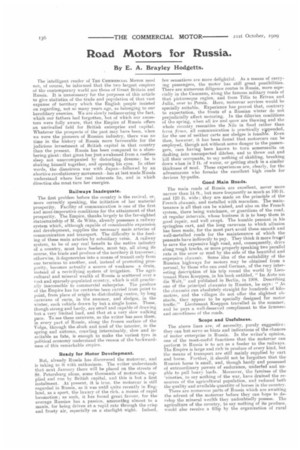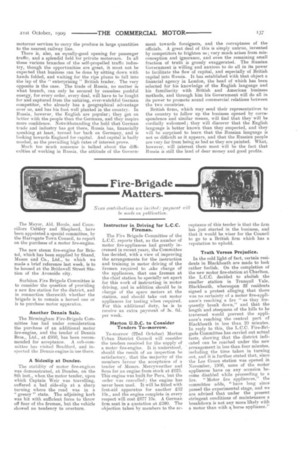Road Motors for Russia.
Page 6

Page 7

If you've noticed an error in this article please click here to report it so we can fix it.
By E. A. Brayley Hodgetts.
The intelligent reader of THE COMMERCIAL MOTOR need not, of course, be informed that the two largest empires of the contemporary world are those of Great Britain and Russia. It is unnecessary for the purposes of this article to give statistics of the trade and population of that. vast expanse of territory which the English people insisted on regarding, not so many years ago, as belonging to our hereditary enemies. We are slowly rediscovering the fact, which our fathers had forgotten, but of which our ancestors were fully aware, that the Empire of Russia offers an unrivalled field for British enterprise and capital. Whatever the prospects of the past may have been, when we were the pioneers of Russian industry, there was no time in the history of Russia more favourable for the judicious investment of British capital in that country than the present. Russia has been compared to a slumbering giant : that giant has just awakened from a restless sleep not unaccompanied by disturbing dreams ; he is shaking himself together, and opening his eyes. In other words, -the disastrous war with Japan—followed by an abortive revolutionary movement—has at last made Russia understand where her real interests lie, and in which direction she must turn her energies.
Railways Inadequate.
The first problem before the country is the revival, or, more correctly speaking, the initiation of her material prosperity. Facility of communication is one of the first and most-imperative conditions for the attainment of that prosperity. The Empire, thanks largely to the far-sighted statesmanship of M. de Witte, already possesses a railway system which, although capable of considerable expansion and development, supplies the necessary main arteries of communication and transport. The difficulty is the feeding of these main arteries by subsidiary veins. A railway system, to he of any real benefit to the native industry of a country, must have feeders, must tap, all along its course, the trade and produce of the territory it traverses ; otherwise, it degenerates into a means of transit only from one terminus to another, and, instead of promoting prosperity, becomes actually a source of weaknessa drain, instead of a revivifying stem of irrigation. The agricultural and mineral wealth of Russia is scattered over a vast and sparsely-populated country, which is still practically inaccessible to commercial enterprise. The produce of the Empire has for centuries been carried from point to point, from place of origin to distributing centre, by long caravans of carts, in the summer, and sledges, in the winter, each vehicle drawn by but, a single horse. These, though strong and hardy, are small and capable of drawing hut a very limited load, and that at a very slow walking pace. To see these caravans, as the writer has seen them, in every part of Russia, along the frozen surface of the Volga, through the slush and mud of the interior, in the spring and autumn, crawling interminably, slow and inevitable as fate, is enough to make the veriest tyro in political economy understand the reason of the backwardness of this remarkable empire.
Ready for Motor Development.
But, already Russia has discovered the motorcar, and is taking to it with enthusiasm. The writer understands that next January there will be placed on the streets of St. Petersburg alone, some thousands of motorcabs, supplied and run by British capital, and this is but a first instalment. At preeent, it is true, the motorcar is still regarded in Russia, as it was until quite recently in England, as a sport, the luxury of the rich, a means of rapid locomotion ; as such, it has found great, favour, for the average Russian has a passion, amounting almost to a mania, for being driven at a rapid rate through the crisp and frosty air, especially on a starlight night. Indeed, few sensations are more delightful. As a means of carrying passengers, the motor has still great possibilities. There are numerous diligence routes in Russia, more especially in the Caucasus, along the famous military roads of that picturesque region, and from Tiflis to Erivan and Julia, over to Persia. Here, motorcar services would be specially suitable. Experience has proved that, contrary to expectation, the frosts of a Russian winter do not prejudicially affect motoring. In the diluvian conditions of the spring, when all ice and Know are thawing and the whole country resembles the Nile in flood rather than terra firma, all communication is practically sq,spended, for the use of neither carts nor sledges is feasibre. Even then, however, it has been found that motorcars can be employed, though not without some danger to the passengers, cars having been known to turn somersaults on dashing into unsuspected ditches, and to throw out and kill their occupants, to say nothing of skidding, breaking down when in 2 ft. of water, or getting stuck in a similar thickness of mud. These experiences are clearly, for the adventurous who forsake the excellent high roads for devious by-paths.
Good Main Roads.
The main roads of Russia are excellent, never more narrow than 14 ft., but more frequently as much as 100 ft. and 120 ft. wide ; they are made on the principle of the French chaus.0.e, and metalled with macadam. The maintenance is all that can be wished, and also on the French system, there being watchmen, or guardians of the road, at regular intervals, whose business it is to keep them in good repair, and well swept. The humble peasant in his springless cart, and the long caravans to which allusion has been made, for the most part avoid these smooth and well-metalled roads for the maintenance of which the peasants have indirectly to pay. They think it more frugal to save the expensive high road, and, consequently, drive along rough tracks, or more properly speaking two parallel ruts in the snow or mud by the side of the beautiful and expensive chatissr%e. Some idea of the suitability of the Russian highways for motors may be obtained from a perusal, by those who can read German, of the very interesting description of his trip round the world by Lieutenant T-Tans Koeppen, in his book entitled, " Im Auto um die Welt," and published in Berlin, in 1908. Describing. ono of the principal chaussees in Russian, he says: " As the chausseRs run absolutely straight for hundreds of kilometres, and the villages do not offer the slightest obstacle, they appear to be specially designed for motor traffic." Lieutenant Koeppen travelled in the summer, and he pays a well-deserved compliment to the firmness and smoothness of the roads.
Scope and Usefulness.
The above lines are, of necessity, purely suggestive : they can but serve as hints and indications of the chances. of motor enterprise in II ussia. In the writer's opinion, one of the most-useful functions that the motorcar can perform in Russia is to act as a feeder to the railways. The Empire is large and rich in produce of every kind, but the means of transport are still mainly supplied by cart and horse. Further, it should not be forgotten that theRussian horse is small, and, though hardy and possessed of extraordinary powers of endurance, underfed and unable to pull heavy loads. Mm-cover, the famines of the 'nineties, to say nothing of the war, have drained the resources of the agricultural population, and reduced both the quality and available quantity of horses in the country.
There are numerous parts of Russia which are awaiting the advent of the motorcar before they can hope to develop the mineral wealth they undoubtedly possess. The agriculture of the country, to say nothing of its produce, would also receive a fillip by the organization of rural' motorcar services to carry the produce in large quantities to the nearest railway line. There is, also, an equally-good opening for passenger traffic, and a splendid field for private motorcars. In all these various branches of the self-propelled traffic industry, though the opportunities are great, it must not be expected that business can be done by sitting down with hands folded, and waiting for the ripe plums to fall into the lap of the " enterprising" British trader. The very opposite is the case. The trade of Russia, no matter in what branch, can only be secured by ceaseless pushful energy, for every order, every deal, will have to be fought for and captured from the untiring, ever-watchful German competitor, who already has a geographical advantage over us, and has his foot well planted in the country. In Russia, however, the English are popular ; they get on better with the people than the Germans, and they inspire more confidence. Notwithstanding the hold that German trade and industry has got there, Russia has, financially speaking at least, turned her back on Germany, and is looking towards England for capital. And capital is badly needed, as the prevailing high rates of interest prove. Much too much nonsense is talked about the difficulties of working in Russia. the attitude of the Govern meat towards foreigners, and the corruptness of the officials. A great deal of this is simply untrue, invented by competitors to frighten us; very much arises from misconception and ignorance, and even the remaining small fraction of truth is grossly exaggerated. The Russian Government is willing and anxious to do all in its power to facilitate the flow of capital, and especially of British capital into Russia. it has established with that object a financial agency in London, the head of which has been selected for his knowledge of the English language and his familiarity with British and American business methods, and through him his Government will do all in its power to promote sound commercial relations between the two countries.
British firms, which may send their representatives to the country to follow up the business opened by correspondence and similar means, will find that they will be cordially welcomed ; they will discover that the English language is better known than they suspected, and they will be surprised to learn that the Russian language is not so difficult as it appears, and that the Russian people are very far from being as bad as they are painted. What, however, will interest them most will be the fact that Russia is still the land of dear money and good profits.






















